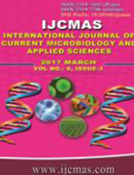


 National Academy of Agricultural Sciences (NAAS)
National Academy of Agricultural Sciences (NAAS)

|
PRINT ISSN : 2319-7692
Online ISSN : 2319-7706 Issues : 12 per year Publisher : Excellent Publishers Email : editorijcmas@gmail.com / submit@ijcmas.com Editor-in-chief: Dr.M.Prakash Index Copernicus ICV 2018: 95.39 NAAS RATING 2020: 5.38 |
The antimicrobial effect of hot and cold water extracts and infusions of herbs oregano (Origanum vulgare L.) and thyme (Thymus vulgaris L.), prepared in concentrations of 20%, was investigated using the classical agar-gel diffusion method. Pure cultures of 20 pathogenic strains were tested (by 4 strains of Pseudomonas aeruginosa, Klebsiella pneumoniae, Pasteurella multocida, Enterococcus faecalis and Candida albicans). The highest antibacterial and antimycotic effect in vitro exhibited the infusions of both herbs, similar to that of the control broad-spectrum antibiotic thiamphenicol. The inhibitory effect of the infusion of thyme was slightly higher than that of the infusion of oregano. Highest sensitivity to both infusions showed the tested strains of P. aeruginosa and C. albicans, and the lowest - these of P. multocida. The cold water extracts of both studied herbs showed less pronounced antimicrobial effect, which was slightly higher in thyme. The cold extract of oregano showed pronounced antibacterial effect against the strains of P. aeruginosa and K. pneumoniae, but not to those of P. multocida. The hot aqueous extracts of the two herbs manifested weakest antimicrobial activity in vitro. The inhibitory effect of hot water extract of oregano was slightly higher than that of thyme.
 |
 |
 |
 |
 |